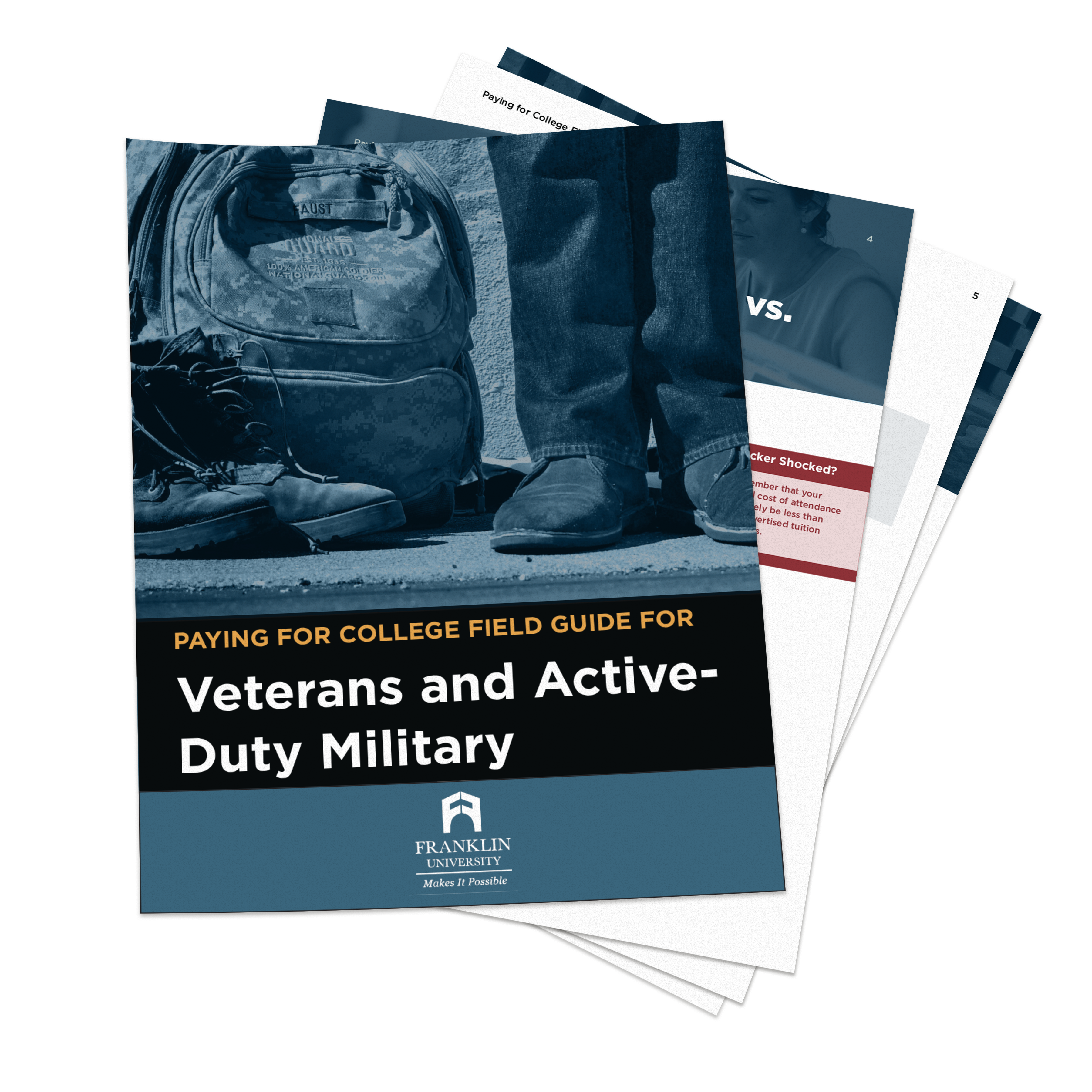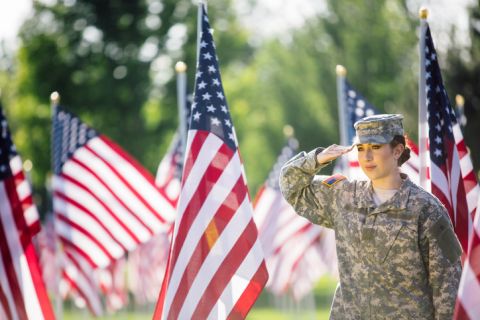Request Information
We're Sorry
There was an unexpected error with the form (your web browser was unable to retrieve some required data from our servers). This kind of error may occur if you have temporarily lost your internet connection. If you're able to verify that your internet connection is stable and the error persists, the Franklin University Help Desk is available to assist you at helpdesk@franklin.edu, 614.947.6682 (local), or 1.866.435.7006 (toll free).
Just a moment while we process your submission.

7 Tips For Finding The Best Veteran Friendly Colleges
New beginnings are both exciting and challenging. This is true for anyone embarking on their next life adventure, but the transition from the military back into civilian life comes with unique complexities. This is especially evident when it comes to former service members looking to further or complete their education. For this reason, finding and evaluating veteran-friendly colleges should be at the top of your list.
There is so much to keep in mind during your search for the best colleges for veterans, from majors and schedules to financial aid and career resources. Once you find a list of contenders that seem to fit your needs, you’ll then want to dig a little deeper to narrow down those options to the best choice for you.
To help you find the right fit, consider these areas as you compare schools and programs:
1. Identify Your Goals
Jason Howard, assistant director of undergraduate academic advising and military & veteran compliance, at Franklin University says veterans may wish to return to school for many reasons, from career advancement and higher earning potential to learning a new skill or acquiring knowledge for personal fulfillment.
Think about what’s important to you. Are you looking to build off your military training and experience, or are you interested in starting a completely new career? Once you have a solid idea of what you’d like to accomplish (and why) by using your veteran benefits, you can begin your search for the best military-friendly colleges and, ultimately, discover the one which will help you reach your goal.
2. Look for Career-Ready Majors
Schools known for offering degrees for veterans and other adult learners often focus heavily on majors that are in line with current market demands. That’s smart. After all, you want the benefits you’ve earned to pay off—and the school wants to see their graduates succeed. While the job market may play a role in what major you’ll choose, your previous work experience, military training and personal interests may also influence your decision.
Howard explains that at Franklin University, for instance, veteran students are often drawn to technology, cybersecurity and business programs. These industries may not only naturally appeal to many veterans, but they are also fields where employment is expected to grow faster than the average occupations.
For example, according to the U.S. Department of Labor, the demand for information security analysts is expected to grow 28 percent through 2026; anything higher than 15 percent is considered “much faster” than the average occupation, which tends to grow five to nine percent. During that same period, demand for web developers will grow by 15 percent, also “much faster” than the average. On the business side, accountants will see about 10 percent growth through 2026, also faster than the average occupation. Other positions, from human resources specialists and budget analysts to computer support representatives and database administrators are all on the rise.
The Department of Labor website, as well as your local career center, may be a helpful place to research what’s in demand in your area. You can also learn how these fields may match available majors and programs at on-campus or online schools for veterans.
Whether you follow the career trends or follow your heart, once you have an idea of majors you’d like to consider, you’re one step closer to finding the best veteran-friendly college for you.
Heading back to school? Don't leave without downloading our free field guide full of tips to your maximize your military or veteran benefits.
3. Evaluate Programs for Flexibility and Convenience
If you’re like a lot of veterans, you may have other obligations, such as work, family and community commitments. A veteran-friendly college will understand the needs of busy adult learners like you, and this means offering courses in a flexible and convenient format.
This likely means evening classes that meet once per week on campus, or maybe programs that meet on weekends. This may even mean a school for veterans with satellite locations closer to your home, allowing you to take in-person classes with less of a commute—which, in turn, cuts down your time commitment.
Better yet, maybe you’re looking to hone your school search into something more convenient, like the best online colleges for veterans. Many schools, like Franklin University, offer on-campus classes as well as 100 percent-online degree programs that match the quality of their traditional programs. For the self-starter student, online courses offer extreme flexibility. While you’ll still have due dates and possible online discussions, you’ll mostly get to work on your own time. The pressure of having to be in a classroom on time, for a fixed period, is removed when you’re an online student.
Finally, overall timeline matters, too. Many adult-friendly degree programs allow you take one course at a time over a shorter term. This accelerated approach gives you more focus than a traditional semester of multiple daytime classes over the course of 3-4 months.
Choosing a school is more than just finding a schedule and location that’s right for you. It’s also about the right atmosphere. It can be very reassuring to a veteran student to know they’ll be in class, either online or in person, with other adult learners. For example, at Franklin University, the average age of a student is 34. This range in age also means students can learn from one another.
“The background of our veteran students really adds to the diversity of the classroom,” explained Howard. “Bringing in a different perspective is valuable, and each person likely had a different path to college, and that adds something to the learning environment.”
4. Look for Strong Academic Support & Career Resources
The best colleges for veterans keep the transition from military service to civilian life in mind when building their programs. In your search, ask schools what services they offer that are extra helpful for, or even specifically designed for, veteran students.
Adult learners often have different needs than a traditional college student. For example, many veterans may be attending college for the first time—or for the first time in many years. Knowing you’ll have access to learning resources, such as tutoring or writing assistance, can bring peace of mind. Likewise, as you move from student to graduate, will your school help prepare you for the job hunt? Interviews? Do they have established relationships with veteran-friendly employers?
Franklin University’s Office of Military and Veteran Affairs, for example, offers a dedicated and one-stop shop for its veteran students. Housed in the academic advising department, this office helps connect those who’ve served in the military to the campus services they need.
5. Ensure College Has Military Benefits Expertise
Perhaps one of the most important factors in your search is how a particular school can help maximize your veterans benefits for college. Depending on when and where you served, and for how long, you likely are entitled to an array of educational programs, like the Post-9/11 GI Bill®. It’s important to speak with someone who has a thorough understanding of these benefits and who also can take the time to explain how they may apply to your unique situation. Like most veteran-friendly schools, Franklin University has expertise in this area.
“We work with our students to help them maximize their VA benefits in the most advantageous way,” said Howard, of Franklin’s advising office.
6. Ask About Transfer-Credit Policy
Aside from participating in programs like the GI Bill, another way to save on tuition and expenses is to reduce the amount of time it takes to complete the degree.
Howard explains that veteran-friendly schools, such as Franklin University, often have a generous transfer credit policy. This can mean reviewing prior college transcripts to see what requirements may have already been fulfilled. And, more unique to veteran students, this also means exploring military training experience to see what might be equivalent to required or elective course work. Depending on your own background and which degree you’re aiming for, you could save significant time and money by getting credit for your service.
7. Find the Right Fit for YOU
All in all, the best colleges for veterans will have paid close attention to the factors we considered here: available majors that meet market demand, dedicated support services, flexible and convenient course offerings, and an understanding of your military education benefits.
Aside from all of these, it’s also about a fit for you. Talk to the people. If you’re planning to attend classes on campus, visit the school. How do you feel while there? What’s the community like? If it’s an online program, will it offer a way for you to connect with your peers?
Do your research. Think about what’s important to you, what’s a must-have and what’s a nice-to-have. Narrow down your options, and then confidently make that life-changing decision you’ve been waiting for!





